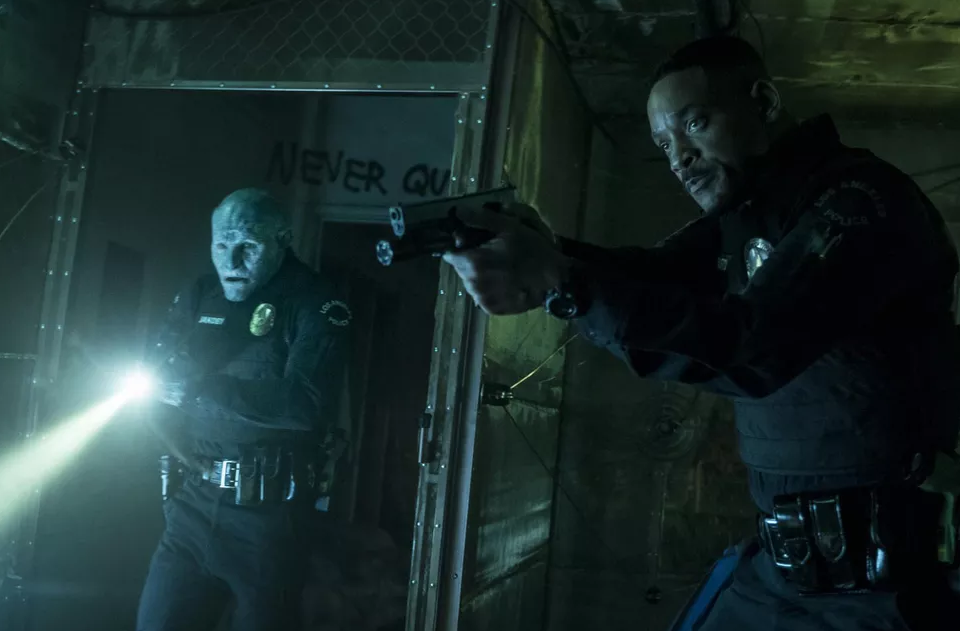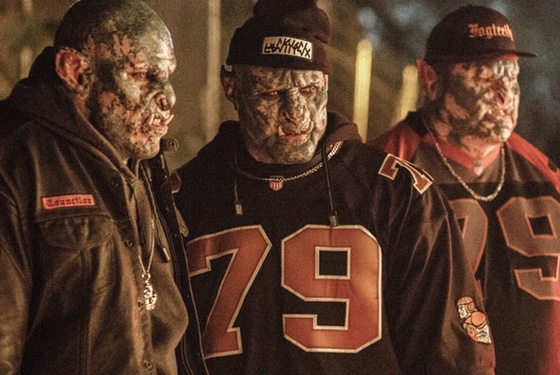
“Fairy lives don’t matter today.”
LAPD officer Daryl Ward (Will Smith) says this in the opening minutes of Bright, a buddy cop actioner from director David Ayer (writer/director of End of Watch and Suicide Squad) and credited writer Max Landis (a notorious Hollywood wunderkind who, it should be noted, is facing multiple accusations of sexual assault), to the presumed gangbangers he, ironically, lives next to. He then proceeds to beat a fairy (who is just sentient enough to mug for the camera, but is more like an assholish rodent than an assholish person) away from his birdfeeder with a broom while his neighbors cheer him on. “Now take him out LAPD-style,” says one of the boys once Ward knocks the fairy to the ground, prompting the cop to smash its guts out.
I’m speaking as a fairly privileged guy who happens to be an ardent fan of Ayer’s work and really likes Will Smith (who reportedly improv’d the line), so feel free to take this incoming breakdown with a grain of salt. But for me, this throwaway joke contextualizes the world of Bright—which supposes “What if Lord of the Rings happened and then society modernized?”—in an interesting way. In thinking of this line, I can’t help but flash back to a scene from Straight Outta Compton, where the members of NWA are getting hassled outside their studio by a cop who happens to also be black. Police brutality is not a literal black vs. white issue, that scene argues; it’s those in power presupposing that those who aren’t are automatically hoodlums, shooting first and asking questions never since that’s about as often as they’re called to task. Therefore, “Fuck the police, comin’ straight from the underground.”
So what do we have, really, when we have a black police officer co-opting the slogan of an anti-racist, anti-police brutality movement to crack wise with some neighbors who clearly don’t respect cops (they’re literally snarking amongst themselves to the tune of “this fuckin’ guy”) of any stripe? Well, we pretty much have an asshole cop who has issues with prejudice and just happens to be black. See, the way this world works is that there are elves, humans, and orcs. Elves are the one-percenters; the rich, the powerful, the educated. The orcs are the lower classes, many of whom are gangsters and servants. Humans are in the middle; sometimes they rub shoulders with the elves because the elves have power, but they all spit on orcs because they’re orcs. Now Daryl has a wife and kid, and struggles to keep his daughter inoculated against his wife’s own flat-out racist attitudes, but due to an incident glimpsed at the start of the movie, he can’t help but distrust his partner Nick Jakoby (Joel Edgerton), who happens to be the LAPD’s first and only orc serving on the force. When they drive by a group of human cops going buck-wild on a group of orcs, Daryl is compelled to lecture Nick about being a cop and choosing his sworn brotherhood over his blood.

The scene itself is a little much; nothing about how it’s staged feels natural, like it’s shoved in there just to set up an idea. It’s a solid idea, though: Endemic police brutality doesn’t just happen because cops are mostly members of one group that assume the other is trash. There’s also peer pressure to consider, the gradual conditioning of an “us vs. them” mentality that goes beyond color. This could be righteously incisive or just plain tone-deaf; it all depends on what’s done with it.
Unfortunately, nothing is done with it. All that ends up getting tucked in the movie’s back pocket and forgotten about in favor of a simplified R-rated rollercoaster ride. So maybe that’s why the scene felt so out of place.
Ward and Jakoby are called to a scene where Tikka (Lucy Fry), a young elf, is the sole survivor of a massacre. At the center of it is a magic wand, described as “a nuclear weapon that grants wishes.” It doesn’t matter that only magic users (known as “brights”) can touch the damn thing without exploding into dust; everybody wants that kind of power, and nobody can be trusted with it; not other cops, not gangbangers, and certainly not the elf terrorist (Noomi Rapace) the wand belongs to, who wants to use it to resurrect “The Dark Lord” that was beaten back 2000 years ago. The cops have to protect the girl and the wand and survive the night until a human/elf pair of federal agents (Edgar Ramirez and Happy Anderson) can arrive with the calvary. Of course there’s a prophecy involved, and at one point somebody offhandedly mentions that it’s very rare for a human to be able to wield a magic wand, so you can probably figure out where this is going.
Here’s the thing: I think David Ayer’s a strong director, but he’s a little more particular than some people realize. He’s got a knack for breaking down the so-called Alpha Male mentality, exploring its few virtues and many sicknesses, but he does it bluntly, through movies that are jacked up on testosterone and gunfire. It’s all over Harsh Times, End of Watch, and Fury, and you can find more than trace amounts of this fascination in pulp like Street Kings, Sabotage, and even this. It’s what made him such an inspired hire for Suicide Squad, a movie I would’ve loved to have seen before Warner Brothers pissed themselves over Batman v. Superman and ordered Ayer to hastily re-edit his movie into a Guardians of the Galaxy knockoff.
Bright isn’t really Ayer’s forte either. For one thing, he isn’t much of a worldbuilder. He plays well in an established, familiar setting, but for this movie, there doesn’t seem to be a lot of consideration given to how a society with elves, orcs, and fairies living alongside humans would actually work and still resemble our own. If there was, Ayer has trouble conveying it in a way that’s clear and natural. Now, this isn’t the worst thing; the film’s a lot more approachable for not being bogged down in lore, and the superficial work is pretty damn cool. I’ve heard some people bagging on the orc makeup, but while it’s nothing I’d defend, it didn’t really bother me. I was more impressed by Andrew Menzies’ production design, which made the most out of what little they had to go on and did a lot to keep me invested in the rollercoaster of it all when so much else was falling short. Still, just because a story’s world is cool on the surface and easy to get into doesn’t make it absorbing and interesting when you actually live in it for a bit; there aren’t many details here that make this place feel as lived-in as it should. Ayer focuses on telling the story to compensate, but the story doesn’t seem to have much to do with the questions and ideas raised at the top of the movie, leaving them to wither and die. Instead of “Training Day meets Alien Nation” or “End of Watch with magic,” you just get a basic superhero movie that happens to have lots of blood and bad language.

Okay, but how’s the superhero movie? Well, that’s the other thing: Ayer works best when his protagonists have lost control of their situation and have become utterly overwhelmed with the violence surrounding them. At its best, his work seems to put absolutely everything on the table for the final act, good and bad, and his climaxes stop your heart. Once the script he’s working with brings the word “prophecy” into the mix, however, that puts the story on rails in a way that Ayer’s never dealt with before. The idea of prophesized heroism comes part and parcel with the “fantasy” part of Bright‘s urban fantasy setting, and leaning into it isn’t a bad thing in and of itself. You just have to know what questions to hinge your dramatic arcs on. So the movie is Ward and Jakoby working their way through a hellish night in the inner city with no backup, no respite, and only a vague clue of how to make it stop. That could be a blast, but Bright seems more concerned with whether or not they’ll survive instead of what that survival will cost them, and that’s a mistake. Because through the whole thing, in the back of your mind, you know they’re going to be okay because they’re in a prophecy. In fact, something happens late in the movie that should turn everything on its head, but the film immediately walks it back and then states, out loud, that it’s because of the prophecy. Ayer doesn’t seem to know how to roll with his story being on rails like this.
One thing Ayer’s movies have always been good (or at least solid enough) about in the past, however, are action scenes, but this time they don’t measure up. I think I know why: Dan Bradley shot second unit here, his first time working with Ayer. While he’s been involved with some solid thrillers (Mission Impossible: Ghost Protocol), he’s a big proponent of the “shake the shit out of the camera and call it a day” school of action movie filmmaking. If you can’t keep him in check, your action scenes are going to look borderline incomprehensible and lack for impact, and that’s exactly what happens here. There’s no flow to the action scenes, nothing that brings you to a boil and makes you say “ow, shit” or “fuck yeah.” You’re too busy trying to figure out what’s actually going on in the scene; by the time you do, the film has moved on and so have you, unfulfilled.
In situations like this, a good cast can still keep the whole thing afloat for me; that’s the case for Bright, if only barely. As Ward, Will Smith’s trying to walk the line between being Will Smith and being a gritty David Ayer protagonist in the tradition of Christian Bale, Jake Gyllenhall, and Brad Pitt. He’s not as successful as I had hoped, but at the end of the day he’s still Will Smith and he’s still a magnetic presence in any movie he’s in. Joel Edgerton’s Jakoby is built to counterbalance Ward with a sunnier, almost cartoonishly innocent disposition, and it comes off strange at first. On a certain level it’s clever; we don’t know what to make of this sweetheart who happens to be an orc in a cop uniform, therefore it’s hard to connect with him, which puts us right in the shoes of Ward and his fellow officers. It’s still really awkward to watch, but at least it gets better and more comfortable as the movie goes along and Jakoby runs through his arc. Throw in a weirdly fascinating villain turn from Noomi Rapace and some welcome, all-too-brief “hey it’s that guy” performances, mix in the aformentioned production design, some solid photography from Roman Vasyanov, and the obnoxiously unquantifiable David Ayer vibe that I’m personally into, and ultimately, you’ve got a movie that holds my attention, gives me a few smiles, and may even bring me back for more.

Still, so many of Bright‘s biggest sins would be resolved if Ayer worked closely with somebody who knew how to build out worlds like this thoroughly enough for him to just drop in and focus on what he does best. Perhaps that would have resulted in a movie that takes an asshole cop joking that “fairy lives don’t matter” to its natural endpoint instead of hiding behind its rote, threadbare plot whenever it comes close to saying anything of substance, good or bad. But that’s the movie I wish it was. The movie that it is? It’s okay I guess, but it’s clearly not good enough to stop me from wishing for something else.
